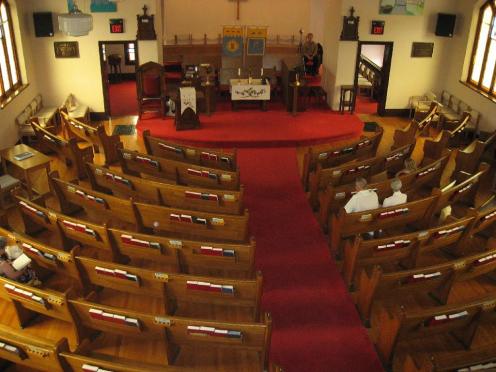| Irish Forums Message Discussion :: Church Of Ireland faced with extinction. Anglicans doomed. |
   | Irish Forums :: The Irish Message
Forums About Ireland and the Irish Community, For the Irish home and Abroad. Forums include- Irish Music, Irish History, The Irish Diaspora, Irish Culture, Irish Sports, Astrology, Mystic, Irish Ancestry, Genealogy, Irish Travel, Irish Reunited and Craic
|  
|
Church Of Ireland faced with extinction. Anglicans doomed.
 

|
|
|
| Irish
Author |
Church Of Ireland faced with extinction. Anglicans doomed. Sceala Irish Craic Forum Irish Message |
BobbyMacQ

Sceala Clann T.D.
Location: Derry roots
|
| Sceala Irish Craic Forum Discussion:
Church Of Ireland faced with extinction. Anglicans doomed.
|
|
|
The numbers are looking very bad for the Anglican Church of Ireland.
Regular worship in both the main Christian based religions of fairy tales, are in terminal decline.

According to feedback from posters in Ireland, it is only immigrants who now attend the Anglican Church of Ireland to worship in any significant regular number.
If it were not for recent immigrants from Africa, the Anglican Church of Ireland would already be doomed. The numbers actually attending worship would be so insignificant as to be irrelevant.
Similar - but not as stark statistics apply to the the Roman Catholic church, with recent Polish and Lithuanians boosting the numbers of faithful attending Catholic worship.
Tuam doom and gloom: The Church of England Newspaper, June 17, 2011 p 7. June 21, 2011
Posted by geoconger in Church of England Newspaper, Church of Ireland.
First published in The Church of England Newspaper.
The Archdeacon of Tuam has issued a blunt warning to General Synod of the Church of Ireland that unless the church moves left and embraces a social justice, relevance and diversity agenda, it is faced with extinction.
In the Commission on Ministry’s report to last month’s General Synod, the committee chairman, the Ven. Gary Hastings, stated that while “metaphors of cancer and the Titanic may be too dramatic” to describe the condition of the Church of Ireland, the church was nonetheless facing a crisis.
“It’s more a matter of slow, quiet, respectable deflation, a gentle haemorrhaging allowing us to drift off to sleep in the damp but hallowed halls of elder glory. If it is a crisis, it is a crisis in slow motion,” he said.
Demographic and cultural trends were working against the church, he said, producing a state of affairs akin to the United States, “where churches and faiths are in a ‘commercial’ context where every religious grouping has an equal place in a competitive market, and is obliged to sell itself and its beliefs as best it can.”
The “result of all this” for the Church of Ireland was that “that numbers in our churches are going down, North and South, and young people are no longer attending.”
Within 20 years, he said, “many small rural churches will either have gone, or be on their last legs” with young people departing after confirmation not to “return later in life with their own children as was once the case.”
Some “specialized” urban churches will survive by offering niche services,“but others are as doomed as any small rural parish.”
To address these challenges the church must overhaul all levels of management “staffing, finance, pensions, income, the grouping and structuring of parishes and dioceses” to meet the coming changes.
On the “religious side” Archdeacon Hastings said, some “will wish to continue to be what they are, the way they always were” while others will “pull sharply to the right, to a more narrowly defined and exclusive theology.”
However, Archdeacon Hastings’ prescription to avoid collapse was for Irish churches “to engage with the culture round them constructively and to vocalise the gospel in a stimulating and relevant way.”
He hoped the Church of Ireland’s “majority will keep its collective head and attempt to achieve a living, breathing, flexible institution” that would be “broad-minded, broad-based, inclusive, outward-looking, and happy to engage with the culture round them constructively.”
The Archbishop of Armagh, Dr. Alan Harper told the Synod: “In the compass of three pithy pages, the Archdeacon of Tuam has sounded the death knell of the Church of Ireland as we know it. Certainly the prognosis he describes sounds terminal. “
“Startlingly, the archdeacon ends his piece by denying that all is doom and gloom,” Dr. Harper noted, adding there was “quite clearly a period of catharsis ahead of us.”
“Catharsis is purgation,” the archbishop observed. “In Aristotle’s “Poetics” it is a purification of the emotions through some vicarious experience.” The archdeacon’s report was a purgative, a “wake up and smell the coffee moment and it is to the General Synod that the wake up call is initially directed,” he said.
The Church of Ireland needed reform, and the work of reform must begin with General Synod, the archbishop said.
Church Of Ireland faced with extinction. Anglicans doomed.
|
|
|
|
|
|
|
|
|
|









